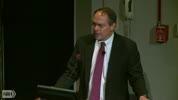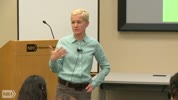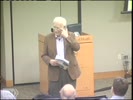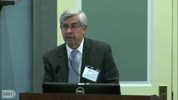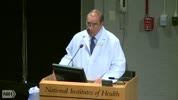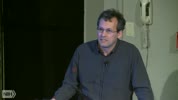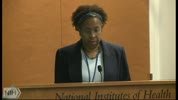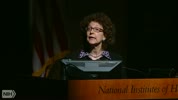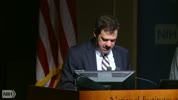-
- NIH VideoCast - CC Grand Rounds: Updates in Diagnosis of Prostate Carcinoma
-
- - (1) Peter Choyke, MD, Senior Investigator and Chief, Molecular Imaging Program, NCI, NIH (2) Peter Pinto, MD Staff Clinician, Urologic Oncology Branch and Head, Prostate Cancer Section, NCI, NIH (2015/04/28)
- - Category : Clinical Center Grand Rounds
- CC Grand Rounds: Updates in Diagnosis of Prostate Carcinoma
For more information go to http://www.cc.nih.gov/about/news/grcurrent.html
NIH VideoCast - CC Grand Rounds: Updates in Diagnosis of Prostate Carcinoma
-
- NIH VideoCast - Academics: Transitioning Successfully from Postdoc to Faculty
-
- - Sharon L. Milgram, PhD, Director, OITE, NIH (2015/04/28)
- - Category : Career Development/OITE
- NIH Office of Intramural Training & Education (OITE)
Congratulations, you`ve accepted a faculty position! This seminar covers navigating the academic environment in your future department. The topics of discussion will include: Deciding what resources you need, Finding and hiring the best research personnel, Department expectations of a junior faculty member, What you should expect early on and setting your early priorities.
For more information go to https://www.training.nih.gov
NIH VideoCast - Academics: Transitioning Successfully from Postdoc to Faculty
-
- NIH VideoCast - The mammalian virome in genetic analysis of health and disease pathogenesis
-
- - Herbert W. `Skip` Virgin IV, M.D., Ph.D., Edward Mallinckrodt Professor and Chair Department of Pathology and Immunology, Professor of Molecular Microbiology, and Professor of Medicine at Washington University School of Medicine (2015/04/28)
- - Category : WALS - Wednesday Afternoon Lectures
- The Annual R. E. Dyer Lecture
Disease occurs in only some people carrying risk alleles, a phenomenon that may well be due in part to the influence of our virome. Chronic virus infection of mice protects the host against cancer and infection through symbiotic stimulation of innate immunity, and can complement multiple genetic immunodeficiencies. The virome may contribute to individual variations in the clinical presentation of disease. However, persistent viruses can also trigger "virus-plus-susceptibility-gene" interactions leading to bacteria-dependent inflammatory disease. These bacteria-dependent phenotypes are only observed when the virus and a mutant allele of a host gene are present at the same time. Virgin hypothesized that trans-kingdom metagenomic (viruses, bacteria, archaea, fungi, metazoans) interactions may regulate virus infection, immunity, and inflammation. His lab confirmed this hypothesis by showing that helminth infection can reactivate latent herpesvirus through cytokine competition between IFN-gamma and IL-4/IL-13 at a viral promoter, and can inhibit antiviral immunity.
The Virgin lab recently found that antibiotic treatment prevents persistent enteric norovirus infection, an effect rescued by fecal transplantation. This effect requires the IFN-lambda receptor but not adaptive immunity. Furthermore, treatment with IFN-lambda cures persistent enteric norovirus infection in the absence of adaptive immune cells, documenting the existence of what we believe to be sterilizing innate anti-viral immunity. These data beg the question of whether the virome is associated with human disease. His lab has found that the enteric virome is abnormal in both Crohn`s disease and ulcerative colitis. They also observed significant disease-specific increases in Caudovirales taxa despite detecting expected decreases in bacterial microbiome diversity. This obesvation is consistent with a predator-prey relationship between the enteric virome and the bacterial microbiome in these diseases. Together these data indicate that mammals are best viewed as composite organisms in which the virome, and trans-kingdom interactions regulating and regulated by the virome, contribute to immunity, disease, and the genotype-phenotype relationship. Genetic analysis of disease risk, and the study of normal immunity, should incorporate consideration of the virome and trans-kingdom metagenomic interactions that control the virome.
About the annual Rolla E. Dyer lecture:
The annual Rolla E. Dyer Lecture features an internationally renowned researcher who has contributed substantially to the medical as well as the biological knowledge of infectious diseases. Established in 1950, the lecture series honors former NIH director Dr. R. E. Dyer, who was a noted authority on infectious diseases.
For more information go to http://wals.od.nih.gov
NIH VideoCast - The mammalian virome in genetic analysis of health and disease pathogenesis
-
- NIH VideoCast - NIH Academy Roundtable 6 - Maternal Health: 2020 Mom Project
-
- - Joy Burkland and Elizabeth Kaplan (2015/04/28)
- - Category : Career Development/OITE
- The NIH Academy provide trainees with an overview of the scientific, social, economic, cultural, environmental, and policy factors that contribute to health disparities. This lecture focuses on disparities in maternal health and maternal mental health.
For more information go to https://www.training.nih.gov
NIH VideoCast - NIH Academy Roundtable 6 - Maternal Health: 2020 Mom Project
-
- NIH VideoCast - JATS-Con 2015, Day 1
-
- - NCBI, NLM, NIH (2015/04/24)
- - Category : Conferences
- JATS-Con is a conference for anyone who uses, or is interested in learning about, the Journal Article Tag Suite (JATS, NISO Z39.96-2012), an XML format for marking up and exchanging journal content.
For more information go to http://jats.nlm.nih.gov/jats-con/
NIH VideoCast - JATS-Con 2015, Day 1
-
- NIH VideoCast - Demystifying Medicine 2015 - NASH (Non Alcoholic Steato-Hepatitis): the Latest Hepatic Epidemic
-
- - Jay Hoofnagle, MD, NIDDK, NIH and Arun Sanyal, MD, VCU (2015/04/24)
- - Category : Demystifying Medicine
- The 2015 Demystifying Medicine Series, which is jointly sponsored by FAES and NIH, will begin January 6th and includes the presentation of patients, pathology, diagnosis and therapy in the context of major disease problems and current research. Primarily directed toward Ph.D. students, clinicians and program managers, the course is designed to help bridge the gap between advances in biology and their application to major human diseases. Each session includes clinical and basic science components presented by NIH staff and invitees. All students, fellows and staff are welcome, as well.
For more information go to http://demystifyingmedicine.od.nih.gov/
NIH VideoCast - Demystifying Medicine 2015 - NASH (Non Alcoholic Steato-Hepatitis): the Latest Hepatic Epidemic
-
- NIH VideoCast - Posttranslational Regulation of the Fanconi Anemia Cancer Susceptibility Pathway
-
- - Hyungjin Kim, Ph.D., Stony Brook University (2015/04/22)
- - Category : DNA Repair
- DNA Repair IG videoconference
Acrobat Slides
NIH VideoCast - Posttranslational Regulation of the Fanconi Anemia Cancer Susceptibility Pathway
-
- NIH VideoCast - Precision Medicine In Action: Applying Genomic Tools To Improve Patient Outcomes After Organ Transplantation
-
- - Dr. Hannah Valentine, Chief Officer for Scientific Workforce Diversity, NIH (2015/04/22)
- - Category : Anita B. Roberts - Distinguished Women Scientists
- Anita B. Roberts Lecture
Dr. Hannah Valentine, NIH???s Chief Officer for Scientific Workforce Diversity, will give the 2015 Anita B. Roberts Lecture Series, which highlights outstanding research achievements of women scientists in the Intramural Research Program.
For more information go to http://sigs.nih.gov/wsa/Pages/Archives.aspx
NIH VideoCast - Precision Medicine In Action: Applying Genomic Tools To Improve Patient Outcomes After Organ Transplantation
-
- NIH VideoCast - Interagency Pain Research Coordinating Committee (IPRCC) - April 2015
-
- - Linda Porter, Ph.D., Director Office of Pain Policy, NIH (2015/04/21)
- - Category : Advisory Board Meetings
- IPRCC Meeting
For more information go to http://iprcc.nih.gov
NIH VideoCast - Interagency Pain Research Coordinating Committee (IPRCC) - April 2015
-
- NIH VideoCast - CC Grand Rounds: (1) New Directions in Population Science Research: Integrative Analyses of Omic Resources (2) Genomics of Coronary Heart Disease: Translating Discoveries to Biology, Prevention and Treatment
-
- - (1) Daniel Levy, MD, Director, Framingham Heart Study and Chief, Population Sciences Branch, NHLBI (2) Christopher J. O`Donnell, MD, MPH ,Chief, Cardiovascular Epidemiology and Human Genomics Branch, Division of Intramural Research, NHLBI and Senior Advisor to the Director of NHLBI for Genome Research and Associate Director, NHLBI's Framingham Heart Study (2015/04/18)
- - Category : Clinical Center Grand Rounds
- CC Grand Rounds: (1) New Directions in Population Science Research: Integrative Analyses of ???Omic??? Resources (2) Genomics of Coronary Heart Disease: Translating Discoveries to Biology, Prevention and Treatment
For more information go to http://www.cc.nih.gov/about/news/grcurrent.html
NIH VideoCast - CC Grand Rounds: (1) New Directions in Population Science Research: Integrative Analyses of Omic Resources (2) Genomics of Coronary Heart Disease: Translating Discoveries to Biology, Prevention and Treatment
-
- NIH VideoCast - Genes, networks and variations of the immune response
-
- - Nir Hacohen, Ph.D., Harvard Medical School (2015/04/18)
- - Category : Immunology
- Nir Hacohen is currently Associate Professor of Medicine at Harvard/MGH and Senior Associate Member of the Broad Institute of Harvard and MIT. He earned a Ph.D. in biochemistry from Stanford and was trained in physics, mathematics and computer science from his undergraduate studies at Harvard University. He joined Harvard/MGH as an assistant professor in 2003 after leading his own lab as an independent Whitehead Fellow at the Whitehead Institute. His honors include the NIH Director???s New Innovator Award, the Sandler Memorial first prize PhD thesis award, and a Helen Hay Whitney Fellowship with David Baltimore.
Nir is an immunologist and geneticist whose lab takes a systems-wide approach to reconstruct intracellular immune circuits, explain variation in immunity across the human population and decipher genetic and non-genetic factors driving disease. He has been studying what drives spontaneous human immunity against cancer, with an eye towards developing personalized therapies based on computational genomics. For example, using RNAi, his group has identified key host pathways supporting or restricting influenza infection and developed practical approaches for gene and network discovery in mammalian cells. More recently, his group is applying systems biology methods to analyze innate immune responses in large human cohorts to determine the genetic basis for the natural variation in these responses (e.g., Lee et al., Science 2014). They are also developing a novel neoantigen tumor vaccine in patients (e.g., Rajasagi et al., Blood 2014), and by utilizing publicly available large-scale TCGA tumor data sets, they have been analyzing the genetic mechanisms underlying tumor immunity (Rooney et al., Cell 2015).
For more information go to http://sigs.nih.gov/immunology/Pages/default.aspx
NIH VideoCast - Genes, networks and variations of the immune response
-
- NIH VideoCast - Office of AIDS Research Advisory Council Meeting (OARAC) - April 2015
-
- - NIAID, NIH (2015/04/18)
- - Category : AIDS Research Advisory Committee
- The Office of AIDS Research will address maximizing U.S. agency partnerships for international HIV/AIDS research. Also an update will be provided o nthe lastest changes made to the federal treatment and prevention guidelines by the OARAC working groups responsible for the guidelines.
NIH VideoCast - Office of AIDS Research Advisory Council Meeting (OARAC) - April 2015
-
- NIH VideoCast - Interagency Coordinating Committee on Fetal Alcohol Spectrum Disorders (ICCFASD) - April 2015
-
- - National Institute on Alcohol Abuse and Alcoholism, NIH (2015/04/17)
- - Category : Advisory Board Meetings
- General Public Interagency Coordinating committee on Fetal Alcohol Spectrum Disorders (ICCFASD) meeting (open to the public)
For more information go to http://www.niaaa.nih.gov/ICCFASD
NIH VideoCast - Interagency Coordinating Committee on Fetal Alcohol Spectrum Disorders (ICCFASD) - April 2015
-
- NIH VideoCast - Decoding genetic skin disorders: lessons and new technologies
-
- - Amy S. Paller, M.S., M.D., Walter J. Hamlin Professor and Chair, Department of Dermatology; Professor, Department of Pediatrics, and Director, Skin Disease Research Center, Northwestern University Feinberg School of Medicine (2015/04/17)
- - Category : WALS - Wednesday Afternoon Lectures
- NIH Director`s Wednesday Afternoon Lecture Series
The underlying molecular basis has been determined for more than 2,000 inherited monogenic disorders, of which at least 20 percent have cutaneous manifestations. The explosion of knowledge about genetics and genetic disease during the past 20 years has helped us to understand how gene changes translate into clinical manifestations. The current availability of whole exome sequencing (WES) is rapidly decoding rare genetic skin disorders, uncovering new causes, facilitating genotype-based diagnosis at a fraction of pre-next generation sequencing costs, and enabling new individualized therapies based on knowledge of the underlying gene mutation. Emerging therapeutic options include the use of topical gentamycin for ???readthrough??? of null mutations, replacement with recombinant protein, topical pathogenesis-based therapy for lipid biosynthesis defects, and cell-based therapies through grafting or stem cell transplantation. An exciting result of WES is the ability to decode somatic mosaic genetic disorders through the comparative analysis of DNA from a lesional skin biopsy and genomic DNA. Many of these mutations in mosaic disorders result from activation of the RAS or PI3K/AKT signaling pathways, allowing targeted topical therapy with small-molecule inhibitors or gene suppression. New technology, such as microneedles and topically applied nanoconjugate creams, promise to deliver antisense DNA or siRNA through the epidermal barrier to skin targets. Clinically normal skin in generalized recessive skin disorders may represent sites of revertant mosaicism, allowing expansion of the patient???s own phenotypically normal cells as replacement of abnormal cells with the risk of immune rejection. These therapeutic options, together with the plummeting cost of technology, will revolutionize our ability to provide personalized therapy for patients with genetic skin disorders.
For more information go to http://wals.od.nih.gov
NIH VideoCast - Decoding genetic skin disorders: lessons and new technologies
-
- NIH VideoCast - Demystifying Medicine 2015 - Sickle Cell Anemia: a Vicious Viscid Sickle Cycle
-
- - Alan Schechter, MD, NIDDK, NIH and Christopher Austin, MD, PhD, NCATS, NIH (2015/04/16)
- - Category : Demystifying Medicine
- The 2015 Demystifying Medicine Series, which is jointly sponsored by FAES and NIH, will begin January 6th and includes the presentation of patients, pathology, diagnosis and therapy in the context of major disease problems and current research. Primarily directed toward Ph.D. students, clinicians and program managers, the course is designed to help bridge the gap between advances in biology and their application to major human diseases. Each session includes clinical and basic science components presented by NIH staff and invitees. All students, fellows and staff are welcome, as well.
For more information go to http://demystifyingmedicine.od.nih.gov/
NIH VideoCast - Demystifying Medicine 2015 - Sickle Cell Anemia: a Vicious Viscid Sickle Cycle
-
- NIH VideoCast - Advisory Committee for Research on Women`s Health - April 2015
-
- - Office of Research on Women`s Health, NIH (2015/04/15)
- - Category : Advisory Board Meetings
- The Advisory Committee for Research on Women`s Health provides advice to the Director, Office of Research on Women`s Health (ORWH) at the National Institutes of Health (NIH) on research activities with respect to women`s health issues.
NIH VideoCast - Advisory Committee for Research on Women`s Health - April 2015
-
- NIH VideoCast - Genomics of amyotrophic lateral sclerosis
-
- - Bryan J. Traynor, MB, MD, PhD, MMSc, MRCPI, Senior Investigator and Chief of the Neuromuscular Diseases Research Section, NIA, NIH (2015/04/15)
- - Category : NIH Director`s Seminars
- NIH Director`s Seminar Series
Amyotrophic lateral sclerosis (ALS; Lou Gehrig???s disease) is a fatal neurodegenerative disorder that leads to rapidly progressive paralysis and respiratory failure. ALS is the third most common neurodegenerative disease in the Western World, and there are currently no effective therapies. Frontotemporal dementia (FTD) is the most common form of dementia in the population under the age of 65. An overlap between these two clinically distinct neurological diseases has long been recognized, but the molecular basis of this intersection was unknown.
Recently, the Laboratory of Neurogenetics at the National Institute on Aging identified the major genetic cause of both ALS and FTD. To do this, Dr. Traynor organized a worldwide consortium, bringing together groups that had previously been competitors to focus their efforts towards identifying this gene. This was made possible by the next generation sequencing technologies available at the NIH. This innovative approach worked, and his group published the cause of chromosome 9-linked ALS/FTD in the journal Neuron in September 2011. In these cases, the disease is caused by a six base pair segment of DNA that is pathologically repeated over and over again, up to several thousand times. This so-called large hexanucleotide repeat disrupts the C9ORF72 gene located on chromosome 9. This is the most common genetic cause of both ALS and FTD identified to date, accounting for approximately 40% of all familial cases of ALS and FTD in European and North American populations. Further, Dr. Traynor???s group has shown that this mutation underlies about 8% of cases of sporadically occurring ALS and FTD that lack a family history. This represents the first time that a common genetic cause has been identified for the sporadic form of these diseases.
The discovery of the C9ORF72 hexanucleotide repeat expansion is a landmark discovery in our understanding of neurodegenerative disease. It has already greatly effected how these diseases are diagnosed, investigated and perceived, and provides a mechanistic link between two clinically distinct disorders, ALS and FTD. It also provides a distinct therapeutic target for gene therapy efforts aimed at ameliorating the disease, and such efforts are already well underway.
NIH VideoCast - Genomics of amyotrophic lateral sclerosis
-
- NIH VideoCast - Protecting data confidentiality in an era with no privacy
-
- - Jerome Reiter, Ph.D., Mrs. Alexander Hehmeyer Professor of Statistical Science, Duke University (2015/04/15)
- - Category : BSSR - Behavioral and Social Sciences
- BSSR Lecture Series
Data stewards seeking to share large-scale data from the health and social sciences face a difficult challenge: they have to release data that (i) protect data subjects` privacy and confidentiality, (ii) are informative for a wide range of analyses, and (iii) are relatively straightforward for a large number of data analysts to use. As the size, richness, and quality of such data have increased, so too have the threats to confidentiality and the scope of the dissemination challenge. In this talk, I describe a vision for an integrated system for disseminating confidential data. The system includes (i) capability to generate highly redacted, synthetic data intended for wide access, coupled with (ii) means for approved researchers to access the confidential data via secure remote access solutions, glued together by (iii) a verification server that allows users to assess the quality of their analyses with the redacted data so as to be more efficient with their use of remote data access. I describe progress to date on building this system, as well as ongoing work on automated methods for generating synthetic data and allowing verification.
For more information go to http://obssr.od.nih.gov
NIH VideoCast - Protecting data confidentiality in an era with no privacy
-
- NIH VideoCast - Social Networks for Molecular Analysis
-
- - Pieter Dorrestein, Ph.D., University of California, San Diego (2015/04/15)
- - Category : National Center for Complementary and Integrative Health
- NCCIH Integrative Medicine Research Lecture
The National Center for Complementary and Integrative Health (NCCIH; formerly NCCAM) presents the Integrative Medicine Research Lecture Series. The series provides overviews of the current state of research and practice involving complementary health approaches and explores perspectives on the emerging discipline of integrative medicine. Pieter Dorrestein, Ph.D., is professor of pharmacology, chemistry and biochemistry in the Skaggs School of Pharmacy and Pharmaceutical Sciences at the University of California, San Diego. In this lecture, Dr. Dorrestein will explore strategies for organizing and visualizing the massive amount of molecular information collected from mass spectrometers. Dr. Dorrestein will also discuss a new social networking tool his lab has launched in order to annotate molecular information and how this tool, which has nearly a billion spectra uploaded and thousands of users from 65 countries, can help further our understanding of molecular complexities.
For more information go to https://nccih.nih.gov/news/events/IMlectures
NIH VideoCast - Social Networks for Molecular Analysis
-
- NIH VideoCast - HHS-Secretary`s Advisory Committee on Blood & Tissue Safety & Availability (ACBTSA) - April 2015 (Day 2)
-
- - HHS Office of the Assistant Secretary for Health (2015/04/11)
- - Category : Advisory Board Meetings
- HHS Advisory Committee on Blood & Tissue Safety & Availability ??? Meeting on Tissue Tracking and Traceability
For more information go to http://www.hhs.gov/
NIH VideoCast - HHS-Secretary`s Advisory Committee on Blood & Tissue Safety & Availability (ACBTSA) - April 2015 (Day 2)



